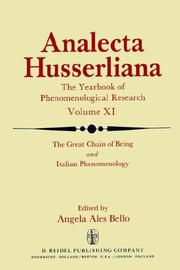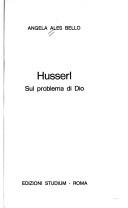| Listing 1 - 10 of 31 | << page >> |
Sort by
|
Book
ISBN: 9781402089107 1402089104 Year: 2009 Volume: 98 Publisher: Dordrecht: Springer,
Abstract | Keywords | Export | Availability | Bookmark
 Loading...
Loading...Choose an application
- Reference Manager
- EndNote
- RefWorks (Direct export to RefWorks)
"In the first part of The Divine in Husserl and Other Explorations a description is provided of Husserl's method in order to explain how he deals with the question of God from a philosophical perspective. The results from this investigation are compared with the main contributions of the philosophers of the past." "The second part focuses on the theme of religion as developed by Husserl in order to grasp the meaning of religious-lived-experiences. Through an archeological excavation Husserl teaches us how to go to the bottom of the sacred and the divine in order to pinpoint their features and to comprehend their religious configurations in history." "In the third part one can find the application of husserlian hyletics and noetics to the field of the archaic sacred and of the different religious experiences. Some particular themes are treated such as ecstasy, contemplation, incarnation, and the relationship between the human being and the God from a philosophical and a religious point of view."--Jacket.
God --- Phenomenological theology --- Phenomenology --- Philosophical theology --- Metaphysics --- Misotheism --- Monotheism --- Religion --- Theism --- Husserl, Edmund --- Husserl, Edmond --- Husserl, Edmund, --- Husserl, Edmund, - 1859-1938 --- Dieu. --- God. --- Phenomenological theology.

ISBN: 9027710716 9401179883 9400983662 9789027710710 Year: 1981 Volume: 11 Publisher: Dordrecht: Reidel,
Abstract | Keywords | Export | Availability | Bookmark
 Loading...
Loading...Choose an application
- Reference Manager
- EndNote
- RefWorks (Direct export to RefWorks)
History of philosophy --- Theory of knowledge --- anno 1900-1999 --- Italy --- Phenomenology --- Philosophy, Italian --- Chain of being (Philosophy) --- Husserl, Edmund, --- Ontology --- -Italian philosophy --- Philosophy, Modern --- Being --- Philosophy --- Metaphysics --- Necessity (Philosophy) --- Substance (Philosophy) --- Great chain of being (Philosophy) --- Continuity --- Cosmology --- Creation --- Husserl, Edmund --- Phenomenology. --- Ontology. --- Phenomenological viewpoints --- -Husserl, Edmund --- Chain of being (Philosophy). --- Phenomenological viewpoints. --- -Philosophy, Modern --- Italian philosophy --- -Being --- Husserl, Edmond --- Philosophy, Italian - 20th century --- Husserl, Edmund, - 1859-1938

ISBN: 883823518X 9788838235184 Year: 1985 Volume: 13 Publisher: Roma Studium
Abstract | Keywords | Export | Availability | Bookmark
 Loading...
Loading...Choose an application
- Reference Manager
- EndNote
- RefWorks (Direct export to RefWorks)
Book
ISBN: 1402089104 9786611871208 1281871206 1402089112 Year: 2009 Publisher: Dordrecht : Springer,
Abstract | Keywords | Export | Availability | Bookmark
 Loading...
Loading...Choose an application
- Reference Manager
- EndNote
- RefWorks (Direct export to RefWorks)
Today, Western thought may be characterized mainly by two temptations. On one hand, greater importance is attributed to reason and, on the other hand, there appears more and more a tendency to renounce respond to the most important questions, among which we find the question of God. This produces a double result: fideism or atheism. Edmund Husserl was able to go beyond this contraposition, digging inside human interiority to grasp the sense of human operations that lead to transcendence. Angela Ales Bello, in the first part of her book, The Divine in Husserl and Other Explorations, provides a description of Husserl’s method in order to explain how he deals with the question of God from a philosophical perspective. The results from this investigation are compared with the main contributions of the philosophers of the past. The second part focuses on the theme of religion as developed by Husserl in order to grasp the meaning of religious lived-experiences. Through an archeological excavation Husserl teaches us how to go to the bottom of the sacred and the divine in order to pinpoint their features and to comprehend their religious configurations in history. In the third part one can find the application of husserlian hyletics and noetics to the field of the archaic sacred and of the different religious experiences. There are treated some particular themes as ecstasy, contemplation, incarnation, and the relationship between the human being and the God from a philosophical and a religious point of view.
Husserl, Edmund. --- Religion. --- God --- Phenomenological theology --- Religion - General --- Philosophy --- Religion --- Philosophy & Religion --- God. --- Philosophy. --- Husserl, Edmund, --- Hu-sai-erh, --- Gusserlʹ, Ėdmund, --- Huserl, E., --- Khuserl, --- Husserl, E. --- Huserl, Edmund, --- Hūsirl, Idmūnd, --- הוסרל, אדמונד, --- 胡塞尔, E, --- Husserl, Edmund --- Husserl, Edmond --- Philosophy and social sciences. --- Education --- Philosophy of Religion. --- Educational Philosophy. --- Philosophy, general. --- Philosophy of Man. --- Philosophy of Education. --- Metaphysics --- Misotheism --- Monotheism --- Theism
Book
ISSN: 22808728 ISBN: 9788837228736 8837228732 Year: 2015 Volume: 62 Publisher: Brescia Morcelliana
Abstract | Keywords | Export | Availability | Bookmark
 Loading...
Loading...Choose an application
- Reference Manager
- EndNote
- RefWorks (Direct export to RefWorks)
Le scuole filosofiche rappresentano comunità di ricerca attorno a un focus unitario: perciò soffermarsi sul rapporto tra Edith Stein e il suo maestro Edmund Husserl è un modo per indagare la nascita della scuola fenomenologica nel Novecento. Se non è possibile comprendere cosa sia la fenomenologia limitandosi alle opere dei discepoli di Husserl, tanto più è necessaria una conoscenza approfondita del Maestro per comprendere ciascuno degli allievi, anche quando se ne siano poi allontanati. I testi qui raccolti scavano nelle indagini husserliane e mostrano che senza un riferimento a Husserl non è possibile parlare della filosofia della Stein: seguendo le riflessioni di entrambi ci si trova ad affrontare i grandi temi della filosofia occidentale, riguardanti il conflitto fra realismo e idealismo, metafisica e antimetafisica. Due itinerari sì divergenti, eppure meno di quanto si ritenga comunemente: una approfondita lettura dei testi husserliani consente di ascrivere il filosofo a un peculiare "realismo trascendentale che conduce ad aperture metafisiche", avvicinandolo così alla Stein. Tale prospettiva, facendo luce sul legame fra i due pensatori, insieme fa emergere i nodi teoretici della fenomenologia nel suo complesso, di carattere antropologico, gnoseologico, metafisico: qual è il senso dell'essere umano, la sua possibilità di conoscenza e trascendenza? Un percorso di chiarificazione della "cosa stessa" che è il filo conduttore dei contributi di questo volume.
Edith Stein, --- Idealism --- Transcendence (Philosophy) --- Phenomenology --- Metaphysics --- Husserl, Edmund, --- Stein, Edith, --- Husserl, Edmund, - 1859-1938 --- Edith Stein, - sainte, - 1891-1942
Book
Year: 1982 Publisher: Roma: Libreria Goliardica,
Abstract | Keywords | Export | Availability | Bookmark
 Loading...
Loading...Choose an application
- Reference Manager
- EndNote
- RefWorks (Direct export to RefWorks)
Book
Year: 1980 Publisher: Roma: Libreria Goliardica,
Abstract | Keywords | Export | Availability | Bookmark
 Loading...
Loading...Choose an application
- Reference Manager
- EndNote
- RefWorks (Direct export to RefWorks)
Digital
ISBN: 9783319153957 9783319153964 9783319153940 9783319384528 Year: 2015 Publisher: Cham Springer International Publishing
Abstract | Keywords | Export | Availability | Bookmark
 Loading...
Loading...Choose an application
- Reference Manager
- EndNote
- RefWorks (Direct export to RefWorks)
This book proposes a new interpretative key for reading and overcoming the binary of idealism and realism. It explores the way human consciousness unfolds through the relationship between the I and the world—a field of phenomenological investigation that cannot and must not remain closed within the limits of its own disciplinary boundaries. The book focuses on the question of realism in contemporary debates, ultimately dismantling prejudices and automatisms that one finds therein. It shows that at the root of the controversy between realism and idealism there often lie equivocations of a semantic nature. By returning to the origins of modern phenomenology this study mines the Husserlian concept of transcendental idealism. Following this path, and neutralizing the extreme positions of an acritical idealism and a naïve realism, the book proposes a “transcendental realism”: the horizon of a dynamic unity that embraces the process of cognition and that grounds the relation, and not the subordination, of subject and object. The close reading of this reciprocity offered here allows one to surpass the limits of the domain of knowing, leading one to fundamental questions about the ultimate sense of things and their origin.
Philosophy --- Theory of knowledge --- History of philosophy --- filosofie --- geschiedenis --- kennisleer --- existentialisme
Book
Year: 1981 Publisher: Roma Goliardica
Abstract | Keywords | Export | Availability | Bookmark
 Loading...
Loading...Choose an application
- Reference Manager
- EndNote
- RefWorks (Direct export to RefWorks)
Book
Year: 1982 Publisher: Roma Goliardica
Abstract | Keywords | Export | Availability | Bookmark
 Loading...
Loading...Choose an application
- Reference Manager
- EndNote
- RefWorks (Direct export to RefWorks)
| Listing 1 - 10 of 31 | << page >> |
Sort by
|

 Search
Search Feedback
Feedback About UniCat
About UniCat  Help
Help News
News